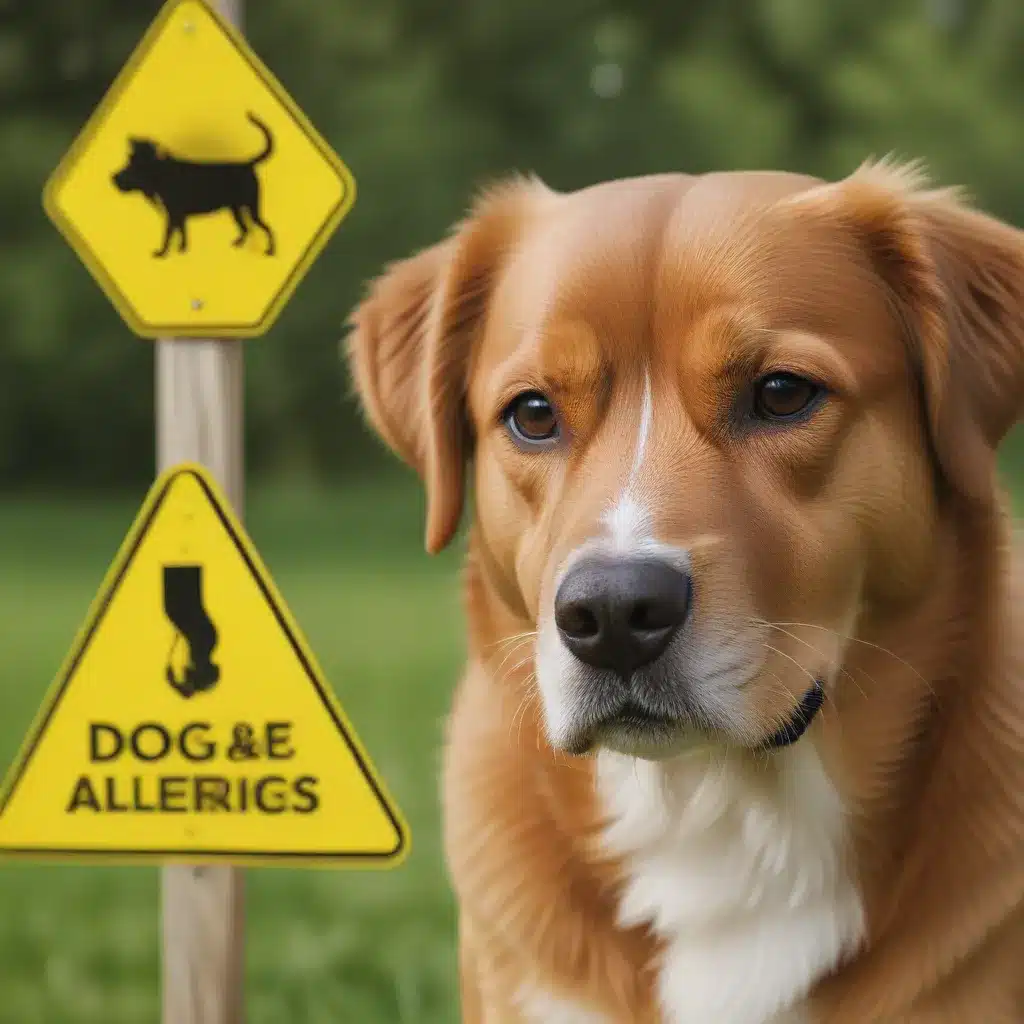
Itchy, Irritated, Inflamed: When Fido’s Allergies Flare Up
Ah, the joys of spring! The blooming flowers, the warmer weather, the…sneezing, scratching, and general discomfort for our canine companions? Yep, that’s right – just like us humans, our furry friends can fall victim to the seasonal allergy woes. And let me tell you, watching your pup suffer through those itchy, watery eyes and persistent paw licking is enough to make any dog parent’s heart break.
But fear not, my fellow dog lovers! I’m here to share the warning signs that your pup may be battling those pesky allergies, as well as some helpful tips to provide them with much-needed relief. So, grab a tissue (for yourself and your pooch), and let’s dive in.
Itchy Skin, Inflamed Irritation
One of the most telltale signs that your dog is dealing with allergies is the constant scratching and licking. I’ve lost count of the number of times I’ve caught my own pup, Rufus, going to town on his belly and paws, desperately trying to find relief from that maddening itch. And let me tell you, it’s not just an occasional scratch – we’re talking about a relentless, obsessive behavior that can lead to hot spots, hair loss, and even skin infections if left untreated.
According to the Animal Humane Society, the itchiness and inflammation associated with allergies typically manifests in the paws, ears, and other areas that come into direct contact with allergens like pollen and mold. So, if you notice your furry friend constantly licking their paws or rubbing their face on the carpet, it’s a good sign that their allergies are in full swing.
The Sniffling, Sneezing, and Swollen Saga
But it’s not just the skin that bears the brunt of allergies in our canine companions. Just like us humans, our pups can also experience respiratory symptoms like sneezing, nasal congestion, and even watery, swollen eyes. According to the VetDERM Clinic, these telltale signs are often more subtle in dogs compared to the dramatic sneezing fits we experience, but they’re still worth keeping an eye out for.
And let’s not forget about those puffy, red eyes – another classic sign that your pup’s allergies are acting up. I’ll never forget the time Rufus came back from the dog park with eyes so swollen, he looked like he’d gone a few rounds with a champion boxer. Needless to say, a quick trip to the vet and some allergy meds had him back to his usual, bright-eyed and bushy-tailed self in no time.
Scratching, Scooting, and Shaking: The Allergy Trifecta
But wait, there’s more! Allergies in dogs can also manifest in some downright comical (yet concerning) behaviors. The Sarasota Veterinary Center points out that dogs with allergies often engage in some rather peculiar actions, like frantically rubbing their face on the carpet, scooting their rear end across the floor, and even shaking their head like they’re trying to rid themselves of an unwanted hitchhiker.
I’ve seen Rufus do all of these things when his allergies flare up, and let me tell you, it’s both heartbreaking and hilarious all at the same time. It’s like he’s trying to scratch an itch that’s just out of reach, or desperately trying to dislodge the source of his discomfort.
Seeking Relief: What to Do When Your Pup’s Allergies Kick In
Okay, so now that we’ve covered the tell-tale signs of allergies in our canine companions, what can we do to provide them with some much-needed relief? Well, the good news is that there are a variety of options available, from good ol’ over-the-counter antihistamines to specialized allergy treatments prescribed by your vet.
According to the Animal Humane Society, some pet-safe allergy meds like Benadryl can be a great starting point, but it’s always best to consult your veterinarian before giving your pup any kind of medication. They can help determine the appropriate dosage and ensure that the treatment is tailored to your dog’s specific needs.
And let’s not forget about those natural remedies! Things like omega-3 fatty acid supplements, medicated shampoos, and even soothing oatmeal baths can work wonders in providing relief for our furry friends. The American Kennel Club recommends exploring these options, especially in conjunction with any prescribed treatments, to help ease your pup’s discomfort.
Allergies Be Gone: Keeping Your Pup Comfortable and Happy
At the end of the day, the most important thing is making sure our beloved canine companions are happy, healthy, and as comfortable as possible. And when it comes to those pesky allergies, taking the time to recognize the warning signs and work with your vet to find the right treatment plan can make all the difference.
So, the next time you see Rufus (or any other pup) going to town on their paws, or notice those telltale sniffles and swollen eyes, remember that you’re not alone. Allergies in dogs are a common and often manageable issue, and with a little bit of TLC and the right support, your furry friend can get back to enjoying all the joys of the great outdoors – without the itchy discomfort.
And who knows, maybe we’ll even learn a thing or two from our canine companions about how to better manage our own allergy woes. After all, dogs have a lot to teach us about living life to the fullest, even in the face of a few sniffles and sneezes. So, let’s raise a (paw-friendly) glass to our allergy-battling pups and the unconditional love they bring to our lives.

